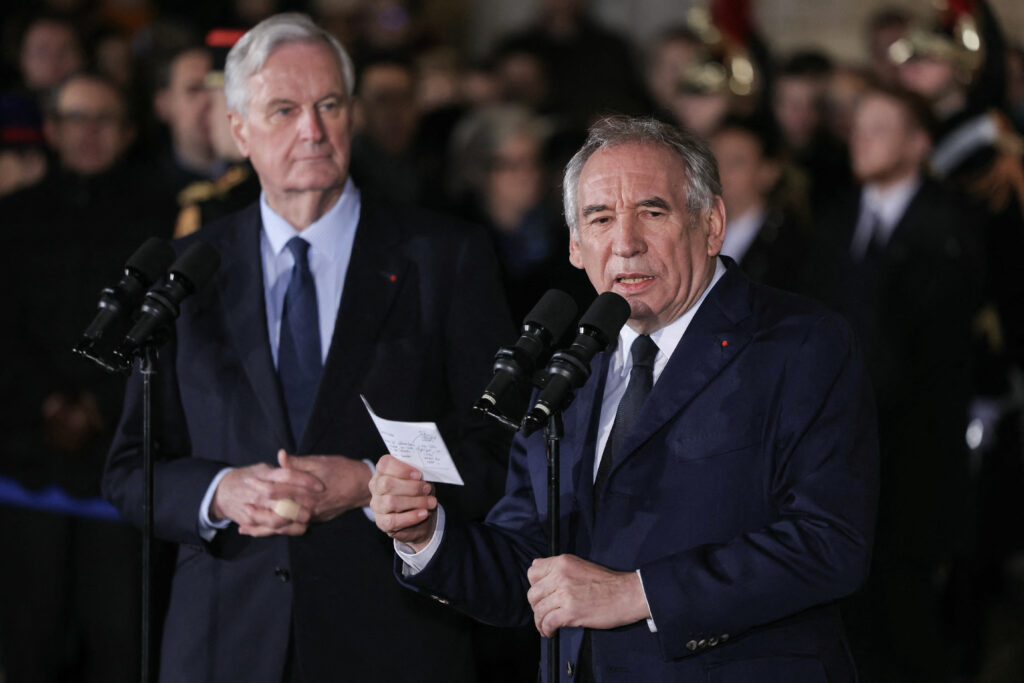Brussels – France finally has a new prime minister. After a whole week of frantic negotiations with parliamentary forces (and after repeatedly exceeding the deadlines he set for the final decision), the President of the Republic Emmanuel Macron nominated liberal ally François Bayrou to succeed Michel Barnier—who was challenged by the Assemblée nationale last December 4 in a historic vote—at the head the transalpine executive.
The meagre communiqué published on the Elysée Palace website very early this afternoon (Dec. 13) puts an end to days-long speculation about who would replace the former EU negotiator for Brexit at the helm of the Palais Matignon, the executive headquarters in Paris. Late in the morning, some news rumours reported that Macron would have been more inclined to entrust the government’s leadership to Roland Lescure, his party colleague. Still, he would have retraced his steps after Bayrou’s threat to withdraw the support of his parliamentary group. This morning’s face-to-face meeting between the two, which ended with Bayrou taking office, lasted nearly two hours.
Who is Bayrou
The 73-year-old is the founder and leader of the liberal Mouvement démocrate (MoDem) party, whose 36 deputies are part of the centrist Ensemble pour la République coalition, which holds a total of 166 seats out of the 575 total in the Parliament. In politics since the 1980s, Bayrou has held several public roles: national parliamentarian between 1986 and 2012, European MP from 1999 to 2002, and minister (first between 1993 and 1997 and most recently, for only one month, in 2017, as Justice Minister in the government of Édouard Philippe, the first of the Macronist era), as well as a three-time presidential candidate (in 2002, 2007, and 2012). Since 2014, he has been the mayor of Pau, a city in the Atlantic Pyrenees in the New Aquitaine region.

He is considered one of the closest Macron’s allies, at least since 2017, when he supported the latter’s bid for the Elysée, although the two have not always agreed on everything. In June 2022, for example, Bayrou had distanced himself from the head of state’s proposal to insert freedom of access to abortion into the Constitution, while in early 2023, he had suggested introducing a review clause in the highly contested pension reform sought by Macron. Last June, the new premier described as “courageous” the decision to dissolve parliament to call early elections.
What happens now
Bayrou will now have to form his team of ministers, which, according to French media, is expected to be rather small. The new executive’s most important task will be to present to the bicameral legislature the draft budget for 2025, which has already been drafted by the outgoing government and is not expected to include significant changes from the allocations already planned for the current year. The Assembly is expected to consider the budget on Dec. 16, while the Senate should vote on the text two days later.
The most delicate passage is likely to be, once again, the indexing of pensions and income taxes to inflation, demanded by several parliamentary forces: a scheme, however, that the Macronists reject and that the Council of State would have rejected sanctioning the impossibility of including it in the budget. The radical left-wing of La France insoumise (LFI), led by Jean-Luc Mélenchon, has already announced that it will oppose the new government, threatening to present as soon as possible a censure motion like the one that brought down Barnier last week.
After eight days of vaudeville, Bayrou is named Prime Minister.
It’s yet another insult to democracy. After losing all the last elections, Macron installs his first and last supporter at Matignon.
Bringing down Bayrou means bringing down Macron….
– Manuel Bompard (@mbompard) December 13, 2024
But on the other end of the political spectrum, the Rassemblement National (RN) sits on the fence. At least for the time being, it seems willing to open a credit to Bayrou: “We will give him a chance, as we did with Michel Barnier,” said far-right MP Philippe Ballard. At the same time, Marine Le Pen announced to expect “the new prime minister to listen to the demands of our 11 million voters.”
Based on statements in the last few hours, the Socialists (PS-PL) should support Bayrou’s government, as should, in addition to the Ensemble deputies, the Républicains (LR), that is, the neo-Gollist conservatives from which Barnier comes. If ecologists and communists—the other components of the Nouveau front populaire (NFP), the alliance of leftists that makes up the largest of the three main blocs into which the transalpine hemicycle is split—will not be in favour of censure, the Bayrou executive should succeed in getting the Parliament’s investiture.
Brussels greets the nomination
The appointment of a prime minister by the Elysée Palace’s tenant would appear to have temporarily ended one of the deepest political crises of the Cinquième République, which began with the débâcle of the liberal coalition at the Europeans last June. European partners and international markets are jittery over the unprecedented instability in French politics and heaved a sigh of relief after today’s announcement. The chairwoman of the EU executive, Ursula von der Leyen, congratulated Bayrou, recalling that he has “always had Europe at heart” and declaring herself ready to “work together for a stronger and more competitive Europe that has the means to defend itself.”

For Italian MEP Sandro Gozi—elected in France to the EU Parliament on the lists of the European Democratic Party (PDE), founded and chaired by Bayrou himself and a member of the Renew Liberal Group—Macron’s choice is “wise and far-sighted” since the new premier ministre “has shown himself to be a man of dialogue, balance, and vision, qualities that are now more indispensable than ever to meet the complex challenges facing France.” According to Gozi, Bayrou “will know how to foster collaboration between different alignments, promoting cohesion and unity” in an Assembly that has never been so fragmented.
English version by the Translation Service of Withub







